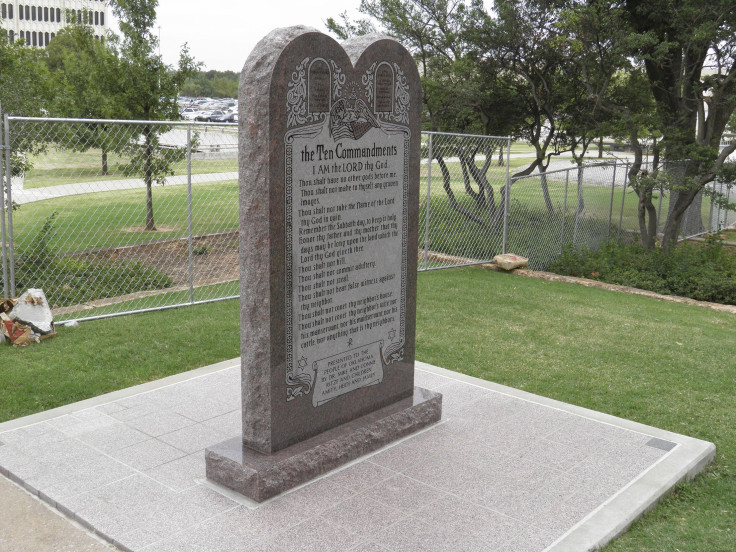Oklahoma Ten Commandments Monument Removal Celebrated By Secularism Activists

A granite monument bearing the Ten Commandments was removed from the Oklahoma Capitol grounds Monday night, a move activists who focus on the separation of church and state say is an important step in a culture that is increasingly blurring the lines between the two.
“We’re delighted that reason and the secular constitution [have] prevailed,” said Annie Laurie Gaylor, co-founder and president of the Freedom From Religion Foundation, an organization that works to protect the constitutional principle of the separation of church and state. “This was a very resounding decision by the Oklahoma State Supreme Court. The legal question was clear in that the monument on government grounds was unconstitutional.”
“It’s not the business of the state of Oklahoma to tell citizens which gods to have, or to have any gods at all,” Gaylor added.
The Oklahoma Supreme Court ruled in June the monument's display at the Capitol violated the state’s constitutional ban on the use of public property to support “any sect, church, denomination or system of religion.” The ruling came after a lawsuit initiated by Bruce Prescott, a Baptist minister who argued that it had no place on state grounds.
David Niose, legal director of the American Humanist Association, said the removal of the Ten Commandments from government spaces was just one of the battles organizations like his and others are fighting.
“It’s just one front. There are various battles being fought in the culture wars,” Niose said. “The effort to put up Ten Commandments wherever and whenever possible is one effort the religious right is promoting. But there are many others.”
Niose cited, as an example, the nationwide effort to put “In God we trust” stickers on police cruisers around the country. “Obviously, that’s an effort to promote a certain religious view. It doesn’t have anything to do with any kind of heritage.”
Gaylor said “the pendulum started swinging” in the 1970s, when she and her mother founded the Freedom From Religion Foundation, but the erosion of the separation of church and state principle in the public consciousness has only gotten worse in recent years.
“When have you heard a candidate today say something positive about the separation of church and state? No one will say the exact words that JFK did in 1960 when he was running for president: ‘I believe in an America where the separation of church and state is absolute,’” Gaylor said. “Now we hear Rick Santorum say that the idea makes him want to throw up.”
Activists like Gaylor and Niose say it’s not religion with which they have a problem, but with the idea of it being perpetuated by the government. They argue the First Amendment to the constitution, which prohibits, among other things, “the making of any law respecting an establishment of religion,” is blatantly ignored by the religious right.
“The separation of church and state is good for all of us, religious or not, and we’d argue that’s what’s kept our country free of sectarian strife,” Gaylor said.
Niose agrees. “We simply want religious neutrality in government,” he said. “We’re not looking for an atheist government or a government that promotes any religion. As for religion, we think it’s up to individuals to decide for themselves. How big this particular victory is in the grand scheme of things is hard to say right now, but we’re certainly glad whenever efforts to inject a particular religious view into the public arena are defeated.”
© Copyright IBTimes 2024. All rights reserved.





















